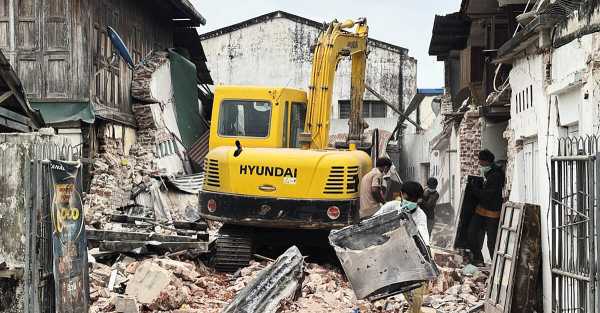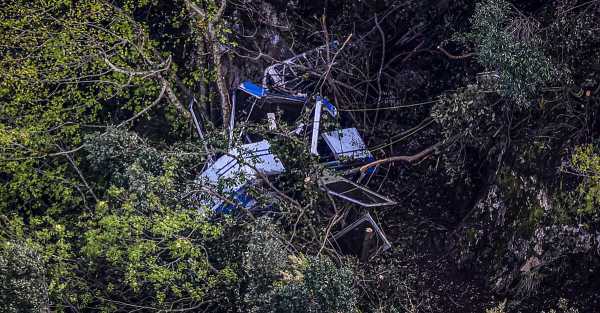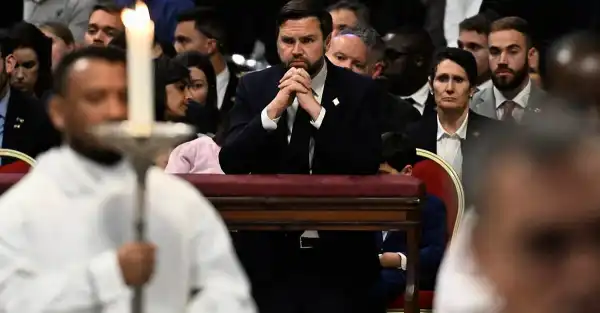The former White House counsel pushed back on President Donald J. Trump’s efforts to overturn the 2020 election and was in the West Wing to witness his actions on Jan. 6, 2021.
-
Send any friend a story
As a subscriber, you have “>10 gift articles to give each month. Anyone can read what you share.
Give this article
- +
- Read in app

Pat A. Cipollone, who served as the White House counsel under President Donald J. Trump, was a witness to key moments during his post-election efforts to retain power.
Pat A. Cipollone, the White House counsel to President Donald J. Trump who repeatedly fought Mr. Trump’s efforts to overturn the 2020 election, has reached a deal to be interviewed by Friday before the House committee investigating the Jan. 6 attack, according to people familiar with the inquiry.
The agreement was a breakthrough for the panel, which has pressed for weeks for Mr. Cipollone to cooperate — and issued a subpoena to him last week — believing he could provide crucial testimony.
Mr. Cipollone was a witness to pivotal moments in Mr. Trump’s push to invalidate the election results, including discussions about seizing voting machines and sending false letters to state officials about election fraud. He was also in the West Wing on Jan. 6, 2021, as Mr. Trump reacted to the violence at the Capitol, when his supporters attacked the building in his name.
People close to Mr. Cipollone have repeatedly cautioned that concerns about executive privilege and attorney-client privilege could limit his cooperation.
But committee negotiators have pressed to hear from Mr. Cipollone and Patrick F. Philbin, who was his deputy in the White House.
Mr. Cipollone will sit for a videotaped, transcribed interview, according to a person familiar with the discussions. He is not expected to testify publicly.
A committee spokesman declined to comment.
The panel’s push to hear from Mr. Cipollone intensified after the testimony last week of Cassidy Hutchinson, a former White House aide to the chief of staff, Mark Meadows. Ms. Hutchinson described detailed conversations with Mr. Cipollone in which she said the counsel had expressed deep concerns about the actions of Mr. Trump and Mr. Meadows.
Some allies of Mr. Trump have privately tried to cast doubt on parts of Ms. Hutchinson’s testimony, which was the committee’s most explosive to date and was delivered under oath.
Mr. Trump has tried to invoke executive privilege — a president’s power to withhold the release of certain confidential communications with his advisers — to prevent his former aides from cooperating with the investigation. In April, Mr. Cipollone and Mr. Philbin both appeared for informal interviews with the panel on a limited set of topics, according to an agreement reached by their representatives and representatives for Mr. Trump.
The agreement, according to an email reviewed by The New York Times, allowed discussions of a meeting with Jeffrey Clark, a Justice Department official who tried to help Mr. Trump cling to power; Mr. Trump’s interactions with John Eastman, the conservative lawyer who drafted a legal strategy for overturning the election; any interactions with members of Congress, and Mr. Cipollone’s recollections of the events of Jan. 6.
The agreement said that the two men could not discuss conversations they had or others had with Mr. Trump, other than one discussion in the Oval Office with Mr. Clark in a pivotal meeting on Jan. 3, 2021.
However, both were permitted to discuss the timeline of where they were, with whom they met and conversations they had on Jan. 6. Assuming those conditions hold for Mr. Cipollone’s forthcoming testimony, they would presumably cover conversations such as ones he may have had with Ms. Hutchinson or other officials that day.
Ms. Hutchinson told the panel that she recalled that on Jan. 6, Mr. Cipollone had objected to suggestions that Mr. Trump join a crowd at the Capitol pressuring to overturn the results of the election.
“We’re going to get charged with every crime imaginable,” Ms. Hutchinson recalled Mr. Cipollone saying.
People familiar with Mr. Cipollone’s schedule on Jan. 6, 2021, say he arrived late to the White House, although it was unclear precisely when.
According to Ms. Hutchinson, Mr. Cipollone urged Mr. Meadows to do more to persuade Mr. Trump to call off the rioters. Ms. Hutchinson also told investigators that she heard lawyers from the White House Counsel’s Office say a plan to put forward pro-Trump electors in states won by Joseph R. Biden Jr. was not “legally sound.”
Members of the House committee had hoped that Mr. Cipollone would testify publicly at a previous hearing, but he declined. They then took their case public. From the hearing room dais, Representative Liz Cheney, Republican of Wyoming, singled out the former White House counsel by name, saying: “Our committee is certain that Donald Trump does not want Mr. Cipollone to testify here. But we think the American people deserve to hear from Mr. Cipollone personally.”
Key Revelations From the Jan. 6 Hearings
Card 1 of 7
Making a case against Trump. The House committee investigating the Jan. 6 attack is laying out evidence that could allow prosecutors to indict former President Donald J. Trump, though the path to a criminal trial is uncertain. Here are the main themes that have emerged so far:
An unsettling narrative. During the first hearing, the committee described in vivid detail what it characterized as an attempted coup orchestrated by the former president that culminated in the assault on the Capitol. At the heart of the gripping story were three main players: Mr. Trump, the Proud Boys and a Capitol Police officer.
Creating election lies. In its second hearing, the panel showed how Mr. Trump ignored aides and advisers as he declared victory prematurely and relentlessly pressed claims of fraud he was told were wrong. “He’s become detached from reality if he really believes this stuff,” William P. Barr, the former attorney general, said of Mr. Trump during a videotaped interview.
Pressuring Pence. Mr. Trump continued pressuring Vice President Mike Pence to go along with a plan to overturn his loss even after he was told it was illegal, according to testimony laid out by the panel during the third hearing. The committee showed how Mr. Trump’s actions led his supporters to storm the Capitol, sending Mr. Pence fleeing for his life.
Fake elector plan. The committee used its fourth hearing to detail how Mr. Trump was personally involved in a scheme to put forward fake electors. The panel also presented fresh details on how the former president leaned on state officials to invalidate his defeat, opening them up to violent threats when they refused.
Strong arming the Justice Department. During the fifth hearing, the panel explored Mr. Trump’s wide-ranging and relentless scheme to misuse the Justice Department to keep himself in power. The panel also presented evidence that at least half a dozen Republican members of Congress sought pre-emptive pardons.
The surprise hearing. Cassidy Hutchinson, a former White House aide, delivered explosive testimony during the panel’s sixth session, saying that the president knew the crowd on Jan. 6 was armed, but wanted to loosen security. She also painted Mark Meadows, the White House chief of staff in the Trump administration, as disengaged and unwilling to act as rioters approached the Capitol.
Any damaging account from Mr. Cipollone of Mr. Trump’s postelection actions would be a dramatic change of circumstance from Mr. Trump’s first impeachment trial, when Mr. Cipollone was his chief defender.
During the first impeachment, Mr. Cipollone accused Representative Adam B. Schiff, the California Democrat who served as a prosecutor in that trial and now sits on the Jan. 6 committee, of making false allegations against Mr. Trump.
A year later, as Mr. Trump pressed on with plans to try to overturn his defeat, Mr. Cipollone and other White House lawyers repeatedly threatened to resign if Mr. Trump went forward with some of the more extreme proposals urged on him, ultimately persuading him to back off.
Mr. Trump’s son-in-law, Jared Kushner, also a former White House adviser, told the panel that Mr. Cipollone’s threats of resignation were frequent, implying that he did not take seriously his concerns and those of other members of the counsel’s office about the gravity of Mr. Trump’s plans.
“Him and the team were always saying: ‘Oh we’re going to resign. We’re not going to be here if this happens, if that happens,’” Mr. Kushner said in videotaped testimony, a clip of which was played during the first public hearing. “So I kind of took it to just be whining.”
Source: nytimes.com



